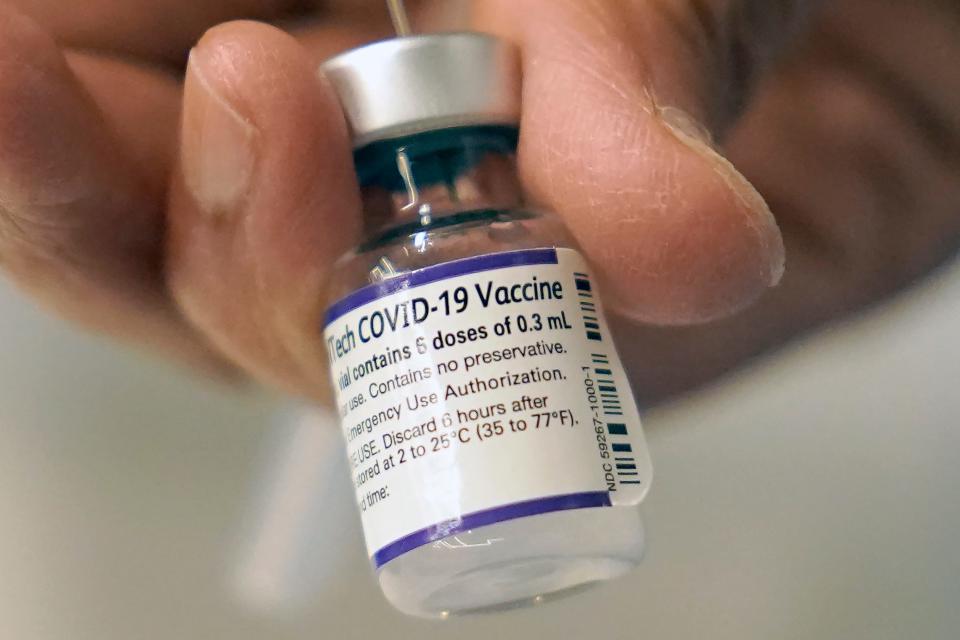COVID-19 entry requirements: Will I need a booster shot to travel in 2022?
If you're traveling outside mainland U.S. in 2022, you may want to consider a booster shot.
A growing number of destinations are putting a cap on how long travelers can get by with a one- or two-dose vaccination series. Without the booster, vacationers could find themselves facing additional entry requirements, unable to access certain venues or denied entry entirely.
Booster requirements are likely just picking up steam, with health experts expecting them to become more widespread as countries mull new ways to crack down on the spread of COVID-19.
"We know that being boosted gives you much better protection, both against illness and serious illness. So it's not surprising," said David Weber, a professor of medicine, pediatrics and epidemiology at the University of North Carolina at Chapel Hill. "I think this will be an ongoing trend for countries that want to limit transmission."

CDC travel warnings: The CDC warns US travelers to avoid more than 100 countries. Do people care?
Omicron travel restrictions: Which countries require a booster shot to enter?
Countries that are altering travel guidance to push for boosters include:
► Spain: Starting Feb. 1, U.S. travelers who had the last dose of their initial one- or two-dose vaccination series 270 days or more before entry will need to show proof of receiving a booster vaccination. Those who do not meet the vaccination requirements will not be able to enter the country for nonessential purposes such as tourism.
► France: The country does not require a booster shot for entry, but a valid vaccine pass is necessary for those who want to enter certain venues such as theaters, museums, cafes and restaurants. Travelers 16 and older must have a booster shot if more than seven months have passed since their second dose (or one dose, if they received the Johnson & Johnson vaccine) to have a valid pass. Starting Feb. 15, the booster shot will be required four months after the second dose.
► Croatia: Croatia is one of a handful of European countries that have put a time stamp on how long a full one- or two-dose vaccination series will be accepted. Travelers must show one of the following to enter: proof of vaccination no older than 365 days; a negative viral test result; or proof of one dose of the vaccine within the past 365 days if they have recovered from the virus within the past eight months. Travelers can also self-isolate upon arrival for 10 days or until they test negative for the virus.
► Austria: U.S. travelers who have received a booster shot will not need to test or quarantine upon arrival. The country says a two-dose vaccination series is valid for 270 days.
► Switzerland: U.S. travelers can enter Switzerland only if they are fully vaccinated. Vaccines must be administered "in full" within the past 12 months. Starting Feb. 1, the country is set to shorten the validity period to 270 days. Government officials have not yet announced whether a booster shot will be required for entry after those 270 days have passed.
► Israel: U.S. travelers must be fully vaccinated to enter Israel, and will need to share how long they plan to be in the country before arrival. If more than 180 days (about six months) have passed since the last jab of a two-dose series before the last day of their trip, travelers will need to get a booster shot at least 14 days before arrival.
► Vietnam: Travelers who have not recovered from the virus must present proof of full vaccination to enter, with the last dose having been received no more than one year prior to entry.
Story continues below.
Hawaii travel restrictions: Is a booster shot required?
The booster requirements are found within some parts of the U.S. as well.
The island of Maui has changed its definition of fully vaccinated so that travelers will need a booster to access certain "high risk" venues like indoor bars and restaurants. The state of Hawaii is expected to require booster shots to bypass testing or quarantine requirements in the coming weeks.
The greater U.S. does not require boosters for entry, but federal health officials suggest everyone ages 12 and older should get a booster shot at least five months after the last dose in their primary series.
Travelers frustrated with rules 'changing all the time'
While health experts and many travelers have voiced support for booster requirements, these changes could curb travel for some or lead to confusion around entry restrictions.
Lindy Glanz of Las Vegas said she recently canceled a trip to Maui after hearing reports that the island would require booster shots to enter. While Glanz herself is fully vaccinated and boosted, her sister – who she had planned to travel with – is not yet eligible for a booster shot.

Hawaii currently allows travelers to skip a quarantine period with a negative pre-arrival coronavirus test, but Glanz said she canceled the trip over fears of needing to isolate under the new entry rules, which have not yet been confirmed by state officials.
"I just don't like how ... things change from one day to the next," she said. "It could be minute to minute. Rules and regulations are changing all the time all over this COVID stuff."
Health experts like Mark Dworkin, professor and associate director for epidemiology at the University of Illinois at Chicago's school of public health, aren't surprised to see more countries tightening vaccination requirements.
"It makes sense that as we learn more about the virus and our immunity, we would be moving towards boosters," Dworkin said. "We've entered a situation where we've learned you need another dose, and over time we will learn whether or not you need another dose after that."
According to the Centers for Disease Control and Prevention, vaccinations continue to prevent severe disease but data suggests their effectiveness wanes over time, especially among people 65 and older. Clinical trials show an additional dose can boost a person’s level of protection against the virus.
"The recent emergence of the Omicron variant further emphasizes the importance of vaccination, boosters, and prevention efforts," the agency’s website reads.
Do U.S. citizens need to be boosted to travel to the EU?
Late last year, the European Commission decided to limit the EU Digital COVID Certificate's validity for travel to nine months without a booster shot, starting Feb. 1. The decision affects travelers from countries within the EU, and does not apply to most U.S. travelers.
But there's a chance for the booster requirement to be extended to U.S. travelers.
The European Commission issued a proposal in November that would require travelers to get a booster shot to be considered fully vaccinated if nine months had passed since the last dose in their primary series.
The updated guidance would replace the EU's previous recommendation that travelers receive authorization to enter 14 days after they have received a primary vaccination series authorized by the European Medicines Agency or World Health Organization.
EU member states are examining the proposal and have not adopted it yet.
Follow USA TODAY reporter Bailey Schulz on Twitter: @bailey_schulz.
This article originally appeared on USA TODAY: COVID entry requirements: Countries ask travelers to get boosted

